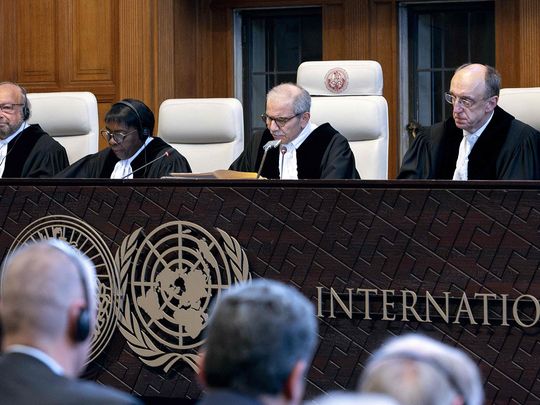
On July 19, 2024, the International Court of Justice (ICJ) issued a landmark ruling addressing the legal consequences of Israel’s policies and practices in the Occupied Palestinian Territory, including East Jerusalem.
It concluded that Israel’s prolonged occupation and efforts towards annexation through settlement are illegal and that its presence in the territories occupied since 1967 is unlawful.
This ruling is poised to be a significant turning point in the ongoing Israeli-Palestinian conflict, presenting challenges that the world, particularly the West, will find difficult to ignore.
The ICJ reaffirmed the relevance of international humanitarian and human rights law, applying it rigorously to Israel’s settlement policy, exploitation of natural resources, and legislative actions in the West Bank and East Jerusalem.
The court’s findings are unequivocal: these actions violate international law, including the Fourth Geneva Convention and the Hague Regulations.
The ICJ’s advisory opinion meticulously examined its jurisdiction and discretion, ultimately concluding that it had the authority to provide the requested opinion. This determination alone is a substantial rebuke to Israel’s contention that the court lacks standing in this matter.
Right to self-determination
The court went further, assessing the broader impact of Israel’s policies on the Palestinian right to self-determination and the legal status of the occupation. Israel has constructed approximately 160 settlements, housing around 700,000 Jews in the West Bank and East Jerusalem in the last 57 years.
This judgment represents a devastating defeat for Israel at the world court, as it consolidates various strands of international law to deliver a comprehensive indictment of Israel’s occupation policies.
Significantly, the ICJ emphasized Israel’s duty to end its occupation and discriminatory practices, and to provide reparations for the harm caused by 57 years of occupation. This directive is not only a moral imperative but also a legal one, placing a clear obligation on Israel.
The ruling also outlined responsibilities for other states and the United Nations, stressing that they must not recognise or support Israel’s illegal actions and must cooperate to end the occupation, ensuring the Palestinian right to self-determination.
This ruling is particularly challenging for Western nations, especially those that have historically been Israel’s allies. While numerous UN reports and General Assembly resolutions have similarly condemned Israel’s actions, the ICJ’s ruling carries significant weight due to its foundation in international treaty and law.
Legal principles in international relations
It presents a stark refutation of Israel’s arguments that political solutions, rather than legal judgments, are the appropriate framework for resolving the conflict. The court’s assertion that international law remains applicable despite decades of failed political efforts underscores the importance of legal principles in international relations.
For the United States, United Kingdom, and European Union, the ruling poses a direct challenge. These countries have often criticized the expansion of settlements rhetorically but have been reluctant to take substantive action.
However, the ICJ’s judgment, with its detailed legal basis and comprehensive condemnation of settlement activities, makes it increasingly difficult for these nations to maintain their previous stance. The ruling provides a robust legal framework that may serve as the basis for future sanctions against Israeli ministers and institutions supporting settlement activities.
The timing of the ICJ’s ruling is also significant. With Israel facing international scrutiny over its conduct in Gaza and the allegations of war crimes, the ruling further isolates Israel diplomatically. The court’s detailed assessment of the illegality of the occupation adds to the mounting international pressure on Israel to change its policies.
The ruling also has implications for international relations and diplomacy. It could potentially spur more countries to recognise Palestinian statehood unilaterally, as witnessed recently by Spain, Norway, and Ireland. The State of Palestine is currently recognised as a sovereign state by 145 of the 193 UN member states.
The court’s findings may galvanize international movements advocating for increased sanctions and pressure on Israel, demanding adherence to international law and human rights standards. The Palestinian Authority and Hamas have hailed the ruling as a significant step toward justice and international recognition of Palestinian rights.
Moreover, the ICJ’s advisory opinion serves as a powerful tool for Palestinian advocacy on the global stage. It validates Palestinian claims of systemic discrimination and unlawful occupation, providing a solid legal foundation for their demands for statehood, self-determination, and reparations.
Palestinian leaders can leverage this ruling in diplomatic engagements, at the United Nations, and in international forums to build stronger coalitions in support of their cause.

Challenging to ignore
The ICJ’s ruling also has the potential to reshape the dynamics within Israel. The current right-wing government, led by Prime Minister Benjamin Netanyahu that includes the far-right pro-settler parties, have embraced policies that are condemned by the international community.
Netanyahu and his ministers have denounced the ruling, asserting that the Jewish people are not occupiers in their historic lands and rejected the court’s decision as biased.
However, the ruling has already emboldened the opposition within Israel, highlighting the long-term unsustainability of the occupation and the need for a just and lawful resolution to the conflict.
Undoubtedly, the ICJ’s advisory ruling on Israel’s occupation of Palestinian territory is a momentous legal and political event that the world, particularly the West, will find challenging to ignore.
It reaffirms the applicability of international law to the conflict, underscores the illegality of the occupation and settlement activities, and places clear obligations on Israel, other states, and the United Nations.
The ruling provides a robust legal framework for increased international pressure on Israel and supports the Palestinian quest for statehood and self-determination.
As such, it represents a critical juncture in the Israeli-Palestinian conflict, with profound implications for international law, diplomacy, and the pursuit of justice and peace in the region.









